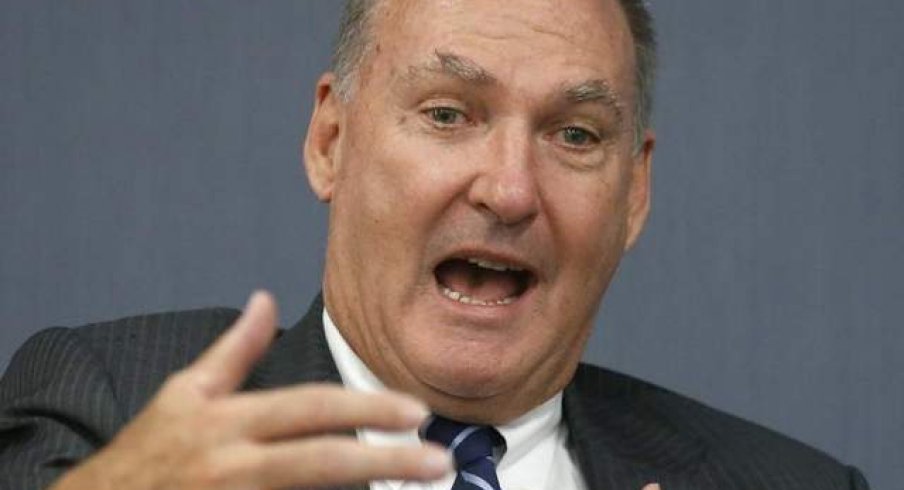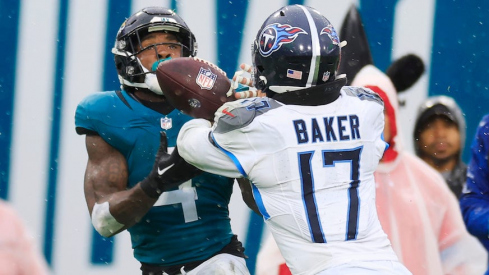Just as the workday was winding down Tuesday, the Big Ten delivered what amounted to breaking news. The league that was progressive in founding its own network but dowdy in the constant opposition to a playoff is welcoming sweeping changes in college sports.
The conference’s 14 presidents and chancellors declared that the current intercollegiate athletics model is under attack and significant overhauls are needed quickly. Among them are guaranteeing four-year athletic scholarships, full cost-of-attendance scholarships, maintaining scholarships for athletes who leave school early and improved medical coverage.
Ohio State already has a program for athletes who pursue professional careers.
The Big Ten’s announcement comes less than a week after commissioner Jim Delany’s testimony in the Ed O’Bannon NCAA antitrust lawsuit and days after USC vouched it will give its football and men’s and women’s basketball players four-year scholarships.
“In taking this action, USC hopes to help lead the effort to refocus on student-athlete welfare on and off the field,” athletic director Pat Haden.
Was the Big Ten’s timing merely coincidental? According to the university leaders, yes. These talks began months ago. But Wisconsin chancellor Rebecca Blank told USA Today “it would be foolish to say there's absolutely no relationship” between the Big Ten’s statement and the O’Bannon case.
College sports is under fire from seemingly every angle. The onslaught has been occurring for years as athletes, fans, the media and some administrators have become disenchanted with the NCAA and its archaic and trivial rulebook. The Big Ten, along with other conferences, doesn’t believe the model is broken, just cracked. At the heart of the O’Bannon proceedings is athlete compensation for use of their names, images and likeness.
Ohio State athletic director Gene Smith has not hidden his feelings on the current state of college athletics. He believes the O’Bannon trial – if the plaintiffs emerge victorious – would be an altering blow to what we now know college sports to be.
“My opinion has been that we need to find a way to be able to provide more financial support to our student-athletes,” he said. “I’ve been a proponent of taking our scholarships, and I don’t want to get too detailed here, and providing cost of attendance to the point where you provide an addition stipend, primarily for those student-athletes who are needy.
“This particular case, it’s a class-action suit, and if they ultimately win it, it will deplete the NCAA endowment fund, it would deplete the reserves of the NCAA. We would have to create a new structure, and we will have to create a new way we do business. It will require us to reduce our sport programs. There’s no way we will be able to fund 36 varsity sports because we will have to come up with a method to provide compensation and all that comes with that to support X number of sports. It’s going to change the business.”
Scare tactics have become the go-to threat. Sure, there are Title IX implications and other far-reaching effects. But there’s still no concrete proof that sports would need to be eliminated.
Northwestern’s unionization effort is viewed as another threat to athletic departments. And it’s likely only the beginning, even if it fails. What the Big Ten’s university leaders hope to avoid are long, drawn out legal battles.
“The best solutions rest not with the courts, but with us – presidents of the very universities that promote and respect the values of intercollegiate competition,” the statement read, which included the signature of Ohio State’s interim president Joe Alutto. “We must address the conflicts that have led us to a moment where the conversation about college sports is about compensation rather than academics.”
Ohio State’s incoming president, Dr. Michael Drake, begins his term on July 1. Drake, a member of the NCAA’s Board of Directors, is aware of the shifting landscape and told Eleven Warriors he hopes it doesn’t result in vast changes that leaves college athletics unrecognizable 10, 15 or 20 years down the road.
“I think there have been things that have been sustaining and very valuable about the collegiate athletic experience, where young men and women from all walks of life get to participate in a variety of sports,” Drake said. “Most of our attention is focused on one’s that tend to be very popular crowd pleasers. But most athletes are participating in sports that very few people watch. They’re there for the purity of the sport. I think that’s something that’s a valuable part of the collegiate experience broadly, and we’d like to maintain that as much as possible.”
Drake is of the realization that change is constant, but the board of directors’ objective is to maintain the elements that have been the backbone of college athletics for more than a century. Multi-year scholarships have been discussed for several years with varying opinions from those in leadership positions.
There’s been little movement in schools shelling out the four-year offers, though USC and the Big Ten’s recent moves could create a domino effect. During his testimony and again Tuesday on Big Ten Network, Delany stressed the importance of balancing athletics and academics. He said he’s in favor of increasing what the conference can do in helping student-athletes pay for education, but not based on on-field performance.
“We need to change the definition of the scholarship from room and board fees and tuition to the total cost of education, which is a federal definition that institutions put a dollar figure around,” Delany said. “We think that the academic experience and the interest of pursuing a degree should carry more weight than the athletic experience.”
Delany, who believes the litigation process will last three to five years, added that the Big Ten sells TV rights to “develop resources for educational opportunities for the 9,000 plus, men and women who are pursuing degrees, full-time students, and playing intercollegiate athletics in the Big Ten.”
"The intercollegiate athletics experience and the educational mission are inextricably linked,” the Big Ten statement reads. “Professionalizing specific sports or specific participants will bring about intended as well as likely unintended consequences in undermining the educational foundation of these programs, on Big Ten campuses and others throughout the country.”
It’s a subject that can be debated for years – and has been. The talks will continue – and grow louder – regardless of what a judge decides and how the NCAA and Big Ten react.


